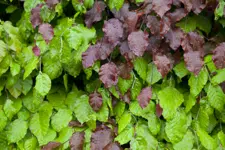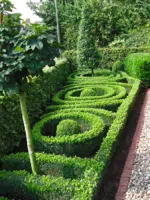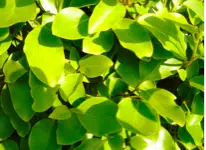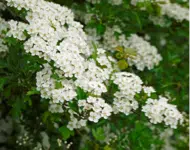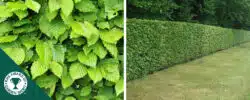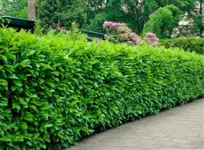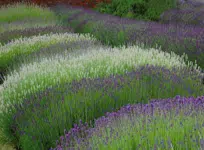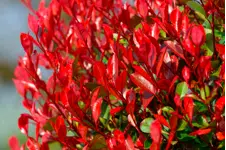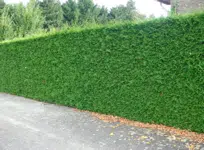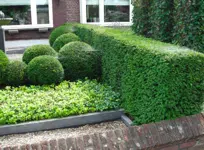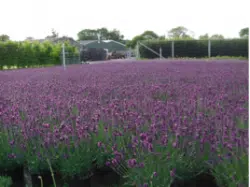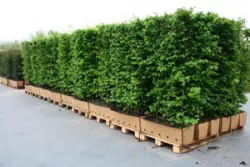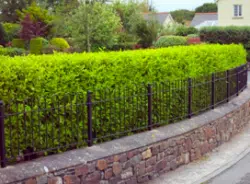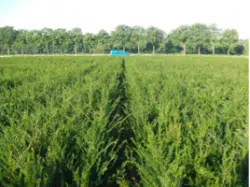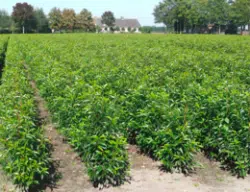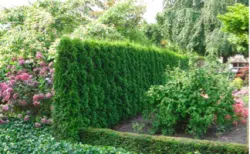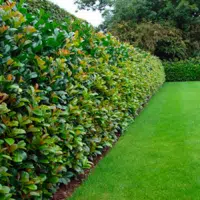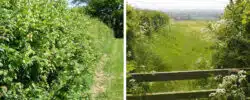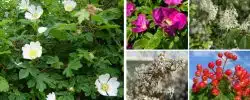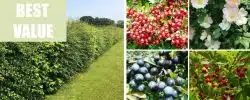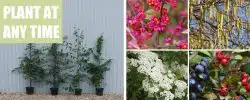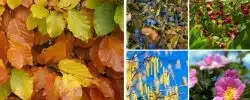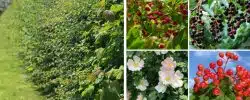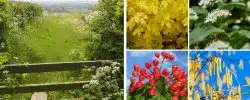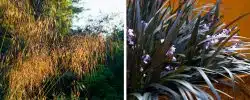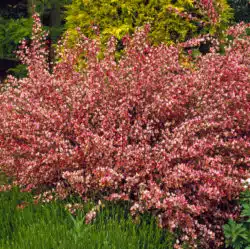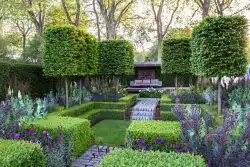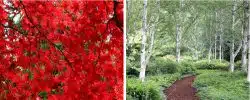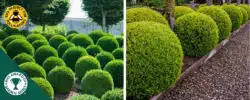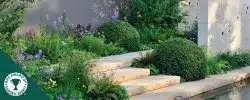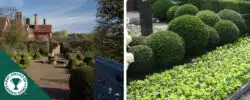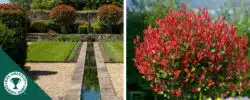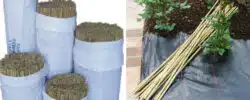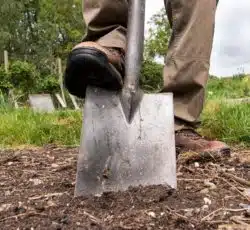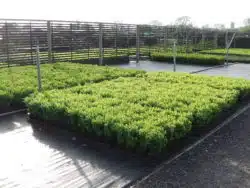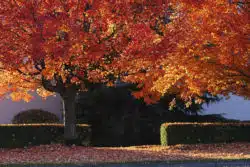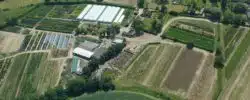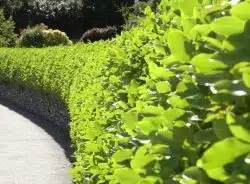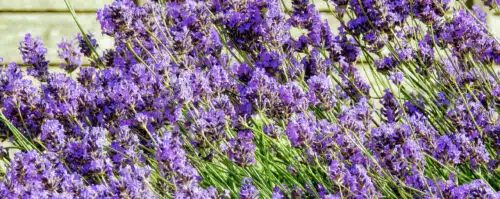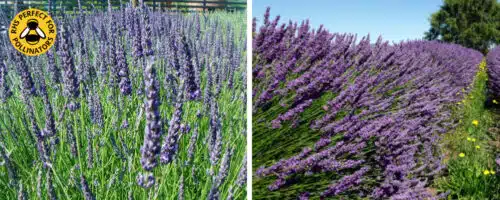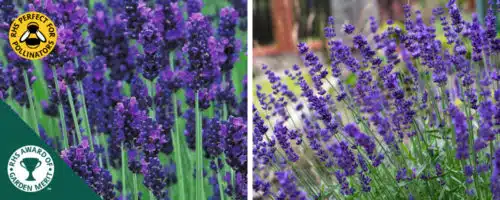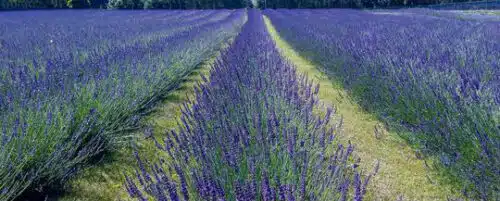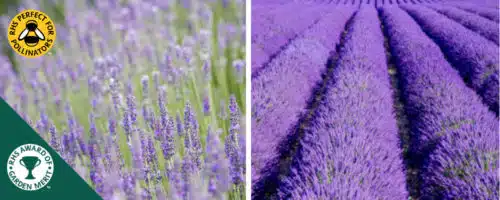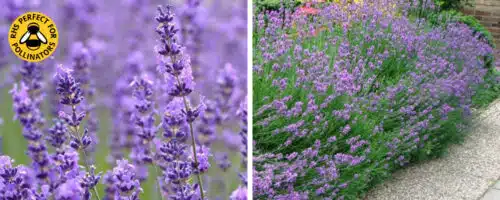Believed to originate from the Mediterranean, India and the Middle East, Lavender is one of the most recognisable plant species in the world. The plant has been used extensively throughout history for its herbal properties and floral fragrance. Today, it is grown commercially for its anti-inflammatory qualities, with Lavender oil used for skin complaints such as acne, burns and insect bites.
Lavender hedges are evergreen, meaning they give structure throughout every season. They are characterised by their blue and purple spires, which gardeners can enjoy all year round. The plants are also extremely beneficial for pollinators, with bees and butterflies being drawn to the alluring scent.
The growth rate of Lavender hedging is moderate, reaching a maximum height of 60-90cm in flower depending on the variety. This makes them the ideal plant for edging and bordering, whilst bringing a touch of colour to your outdoor space.
Benefits of Lavender Hedge Plants in your Garden
The Lavender hedge has a large number of benefits for gardeners compared to conventional hedging varieties:
- Great for pollinators. Lavender is known as one of the most beneficial species to plant that benefits pollinators such as honey bees. Not only are you helping your local honey bee population, but you’re also attracting them to your area making them more likely to pollinate other plants in your garden.
- Acts as a natural insect repellent. One of the lesser-known benefits of Lavender is that it acts as a natural insect repellent. Homeowners enjoying their gardens in the summer will benefit from Lavender repelling a number of insects including mosquitoes, moths, fleas, and flies, which are more of a nuisance in summer months.
- It smells incredible. Having a Lavender hedge in your garden creates a wonderful smell that both you and your neighbours can enjoy. You’ll also benefit from the fragrance when the flowers have dried, as they still retain their scent. These dried flowers can also be used indoors as potpourri and sachets.
We offer a large range of varieties including English Lavender hedges, Vera Lavender, Provence Blue and more.
Browse our varieties above for more information.
Lavender Hedge Care Tips
Lavender hedging plants require slightly more care compared to other hardier hedging plants, but it’s definitely worth the effort if you want to reap the benefits.
The best time to plant Lavender is in early Spring when the soil starts to warm up. The growth season will be starting from April-May, so pollinators like bees and butterflies will be roaming by this time.
Lavender hedges thrive best in dry, chalky soil with good drainage. A number of diseases and common problems with Lavender hedges are caused by wet and humid environments, including the rare but destructive Septoria Leaf Spot and Shab. Planting your Lavender hedge in a dry and sunny place will help to deter a lot of these issues.
Pruning Lavender hedges is very important – they can become woody over time and produce fewer flowers if not regularly cut back. Most varieties will do well if pruned after flowering in late summer. Try to avoid doing this kind of invasive pruning anytime after early Autumn, as you want all the fresh cuts to heal before Winter so the plant will be protected from frost.
Visit our Knowledge Base pages for more information on how to look after Lavender hedge plants.
Lavender Hedge Spacing
Lavender hedge spacing depends on how dense you would like your hedge, however we do recommend in almost all situations, to plant approximately 30cm apart and no more than 5 plants per metre. Smaller plants and smaller varieties can be planted with the maximum number per metre.
Lavender plants can be planted further apart and will eventually meet over time, in fact spacing them further apart will provide you with a hedge of Lavender mounds or ‘bumps’ which look great too.
If you are growing Lavender in a mix bed of plants, allow 30cm space around the plant to allow for good airflow, sun and space to grow.
How to Make Lavender Grow Faster
If you are wondering how to make Lavender grow faster, the best way to do this is to provide the plant with conditions similar to it’s native Mediterranean soil, water and weather.
Lavender will thrive in full sun so make sure you plant Lavender plants in a sunny position in well drained, sandy soil if possible. In the Mediterranean, Lavender will grow in sandy or gritty soil where water drains very easily. Add some sand or horticultural grit to the soil or containers where you are growing Lavender unless you have sandy soil in which case you have the perfect soil for a Lavender hedge.
Lavender plants will also grow woody over time, so it’s important to keep up with pruning. Pruning will encourage new growth with lots of flowers. Prune Lavender every year as soon as the flowers have started to fade, which is usually from midsummer through to early September depending on the variety. Lavender needs plenty of time to regrow before winter sets in, so don’t leave it too late.
Why Choose Hopes Grove Nurseries?
Hopes Grove Nurseries are one of the UK’s leading suppliers of Lavender hedging and other hedge varieties. We’re specialists at growing plant species that are lovingly grown into high-quality plants ready to place in your garden. For over 30 years, we’ve developed unparalleled expertise in different hedge types, from Box hedging to Cherry hedges.
What makes us different? Our passion separates us from our competition. Each and every plant is grown exclusively by us, and given the TLC it deserves. This way, we’re able to retain our extremely high-quality control procedures, so our plants are delivered to you in perfect condition. Our committed staff work 365 days a year in all weather to ensure your Lavender hedges are in the best condition possible. Over half a million planting varieties are grown across our 80-acre site.If you’re interested in our Lavender hedges, take a look at our range above and simply buy online today or call on 01580 765 600..
 Bird Friendly Mixed Native Hedging
Bird Friendly Mixed Native Hedging Edible Mixed Native Hedging
Edible Mixed Native Hedging Farm Stewardship Hedging
Farm Stewardship Hedging Flowering Mixed Native Hedging
Flowering Mixed Native Hedging Garden & Paddock Mixed Native Hedging
Garden & Paddock Mixed Native Hedging Horse Friendly Hedging Plants
Horse Friendly Hedging Plants Pot Grown Mixed Hedging
Pot Grown Mixed Hedging Privacy Mixed Native Hedging
Privacy Mixed Native Hedging Species Rich Mixed Native Hedging
Species Rich Mixed Native Hedging Thornless Mixed Native Hedging
Thornless Mixed Native Hedging